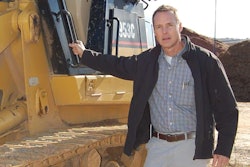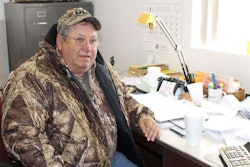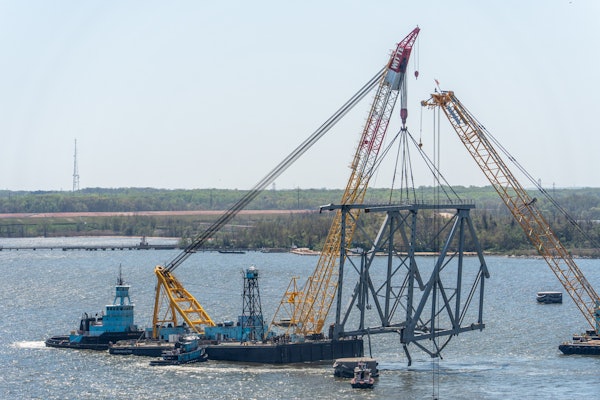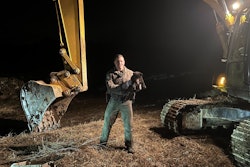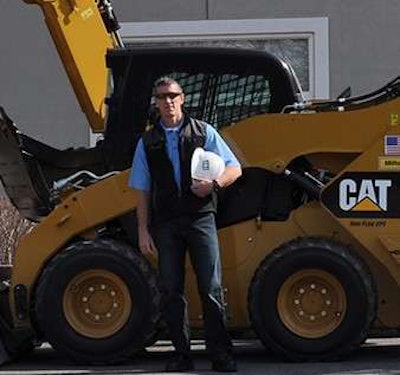
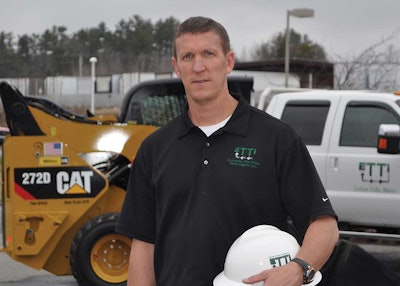
That’s what Scott Kelly remembers thinking in 1995, the first time he saw horizontal directional drilling in action during a demonstration in Shrewsbury, Massachsetts.
Kelly’s father James began researching HDD a year before, so the two were very interested in seeing the relatively new technology in action. Suffice it to say the dealer’s demonstration didn’t go as planned.
But before Kelly and his father could leave, the dealer demoing the equipment convinced them to drive to Providence, Rhode Island for one more look. But this time an experienced crew would be at the helm of a large drill rig. What they saw was an effortless fiber optic installation that started in the morning and was over and done with by the early afternoon.
“I enjoyed the work and I enjoyed the people and there was a sense of pride in quality work.”
Needless to say, Kelly reconsidered.
He borrowed money from his father to buy a Ditch Witch JT3510, a drill much larger than the rig he and his father saw demoed and the largest drill Ditch Witch made at the time. Soon, trenchless utility installations became a side business for Enterprise Electric, the company Kelly’s father started in 1968. Kelly says he is thankful for his father’s help. Even though he has always had good credit, he says he doesn’t know of too many banks that would lend a guy that much money with no business experience.
They spent their first winter advertising the new endeavor and depended greatly on word of mouth.
“It was a challenge at first to get going,” Kelly says. “It was a new technology that a lot of people weren’t familiar with. If it weren’t for our track record on the electical side, we would have had a much harder time develping that comfort with our clients.”
In 1996 the family decided to spin off HDD into a separate company, and Enterprise Trenchless Technologies Inc. was born. Kelly says the company ran around 60 projects in its first year, after a shot in the arm from fiber optic installations for Fontenn in Portland and Westbrook.
Since then, Kelly says ETTI has enjoyed sales increases and a growth in contacts each year except 2005. And while ETTI certainly played a role in pioneering the technology in New England, they are far from without competition today. Thus, success for the company has not simply been the result of a good decision 18 years ago.
Instead, it has come as the result of determination on Kelly’s part to be the best. For ETTI, success is a stew constantly being tasted, its recipe scrutinized and tweaked in order to find the best combination of ingredients.
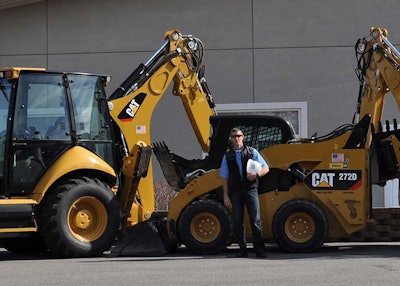 Kelly says “a lot” of ETTI’s equipment is new. “If we’re using it four days a week we should own it,” he says.
Kelly says “a lot” of ETTI’s equipment is new. “If we’re using it four days a week we should own it,” he says.
Industry raised
With his father being an electrical contractor, Kelly says he spent his early teens working summers away in commercial electrical work. He did line work, and when he finished school, obtained a class A lineman’s license.
“I always thought my brother and I would just take over that business,” Kelly says. “I enjoyed the work and I enjoyed the people and there was a sense of pride in quality work. That was what my father’s company was known for. It was something that people celebrated and it made it a fun part of your job.”
Kelly says he looked forward to becoming a part of and eventually taking over the family business. In college he majored in electromechanical technology to do just that. But once he began running ETTI, Kelly says he switched from electromechanical technology classes to business classes.
And for about eight years Kelly also competed in motocross. “It was a passion of mine. You have to love it to do it, and I did,” he says. Kelly noted that the same competitive spirit that propelled him in motocross has been present in his approach to business as well, and fueled his excitement over running his own business.
“I want to be the kind of company that when someone looks at us, they say, ‘I want to be like that’”
“It wasn’t always the case, but I really enjoy the business side of everything now,” Kelly says. “I think I’ve developed into an entrepreneur and I’m always looking for the next thing. I think once I started to make that transition from loving the work and management of the jobsite and started developing more skills to better manage and lead this organization from the office, that’s when I got excited.”
And it shows. A typical day for Kelly begins around 5:30 a.m. and doesn’t end until 7:30 or 8 p.m. “Never in my wildest dreams did I think I would be in this business but I found something I love to do,” he says.
Serving a need
Kelly attributes a great deal of his company’s success to his father James’ foresight and belief in the future of HDD. Kelly continued that decision to always look forward and plan ahead by going after markets that aren’t fragile.
For example, fiber optic installations were a popular source of revenue for HDD contractors before those jobs started drying up in the recession.
“Once we established ourselves as a contractor, we really started to identify markets that were recession-proof like water and sewer,” he says. “New England has the oldest infrastructure in the country and a lot of it is failing.”
And in 2005, ETTI started a new natural gas division after seeing a need from local utility companies. Since then, Kelly says ETTI has held the master contract for Maine Natural Gas and this year signed a seven-year contract extension.
Kelly says his company performs a good mix of public and private work. “We serve everybody from the public works department to Mary Jane who wants an irrigation line and doesn’t want her yard disturbed.” As far as a favorite type of work, Kelly says the more challenging the job, the better.
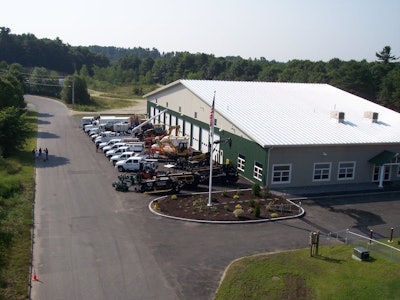 Aerial view of the ETTI offices and machine shop in Lisbon Falls, Maine. The building is 24000 square feet and was built in 2008.
Aerial view of the ETTI offices and machine shop in Lisbon Falls, Maine. The building is 24000 square feet and was built in 2008.He says that in recent years the New England market has become much more competitive as the number of HDD contractors in the region has increased greatly. Contributing to that rise in drillers is how much the HDD equipment has advanced since ETTI started in the mid-90s.
“The original machines we had were very labor-intensive to set up,” he says. “We had to pound 4-foot stakes into the ground with a sledgehammer, the drill rods had to be manually greased. Today we’ve got automatic greasers. Everything is just much faster and more efficient. The electronics are much more accurate which is definitely beneficial to us if we’re digging around existing utilities.”
“Journey to elite”
One of the first things you’ll learn about Scott Kelly upon meeting him and speaking about his company is that he has a very clear vision of what he wants that company’s image to be. “I want to be the kind of company that when someone looks at us, they say, ‘I want to be like that,’” he says.
Kelly says he and everyone else at ETTI “agonized” over a tagline that epitomized where he wanted the company to go. They settled on “Journey to Elite.” And everything since then has simply been follow through.
That’s evidenced by the aluminum rims on company vehicles, the leather interiors on ETTI trucks, the new hard hats ordered every year, slick uniforms and the choice to clean each and every truck at least once or twice a week. Kelly even instituted a wellness program for his employees and installed a two-level gym inside the ETTI offices.
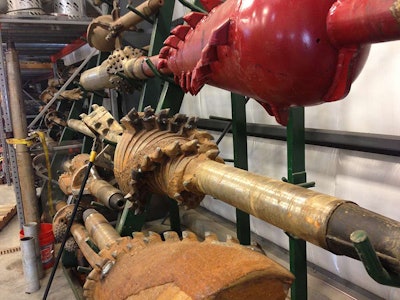 A rack of HDD drill bits in the ETTI machine shop.
A rack of HDD drill bits in the ETTI machine shop.Kelly’s 40 employees (and growing, Kelly says) and their families have 24-hour access to the two-level gym which has about as much equipment as you might find at a Planet Fitness. “We want you healthy,” Kelly says. “If our people are healthy, they’re going to be more efficient, have a better mood and be more productive outside of work as well.”
He also says it’s important to him that he pays his workers well and listens to their concerns. The fact is, Kelly feels it’s important to not only ask the best of those who work for him, but also of himself. Employees are encouraged to lead safety discussions and offer up any ideas to Kelly of how the company can improve its operations.
For instance, employees felt comfortable enough one year to tell Kelly that they were working too many hours. “The ideal amount would have been between 55 and 58 hours per week. So we added more people to cut back on the hours and we saw a noticeable improvement in our efficiency the following year,” Kelly says.
“And last year they said they wanted to work more hours but not weekends. So we did it and you know what? The guys got along more refreshed. That input helped us improve.”
In addition, employees are paid referral bonuses for bringing in other quality employees and they’re compensated for any new ideas and methods for getting a job done that they bring to the table. Kelly looks at it as a molding process that takes a great deal of investment, but which leads to innumerable payoffs in the end.





